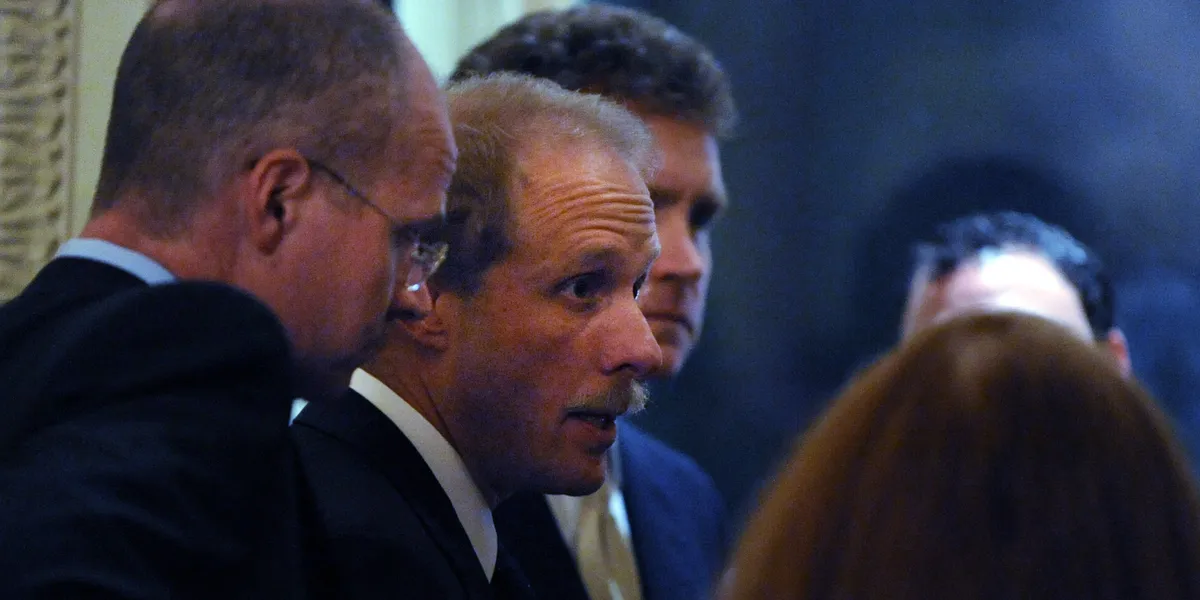President-elect Donald Trump has reportedly offered the number-two Pentagon job to a secretive billionaire investor with close ties to the military-industrial complex, potentially introducing additional conflicts of interest to an incoming administration that is set to be rife with corporate executives and lobbyists.
Stephen Feinberg is co-founder and co-CEO of the private equity behemoth Cerberus Capital Management, which owns a firm that provided paramilitary training to members of the elite team that murdered Saudi journalist and U.S. resident Jamal Khashoggi in 2018.
Trump drew global outrage for publicly defending the Saudi regime in the wake of the assassination, even after U.S. intelligence agencies established that Saudi Crown Prince Mohammed bin Salman authorized Khashoggi’s murder.
The New York Timesreported in 2021 that four Saudis who took part in the 2018 Khashoggi assassination “received paramilitary training in the United States the previous year under a contract approved by the State Department.” Tier 1 Group, an Arkansas-based company financed by Cerberus, provided the training.
“The instruction occurred as the secret unit responsible for Mr. Khashoggi’s killing was beginning an extensive campaign of kidnapping, detention, and torture of Saudi citizens ordered by Crown Prince Mohammed bin Salman, Saudi Arabia’s de facto ruler, to crush dissent inside the kingdom,” the Times noted.
“Having this revolving door of people who sit on boards of major defense contractors and then cycle in and out of the Pentagon is a problem that did not begin with Trump, but is a problem nonetheless.”
It’s not yet clear whether Feinberg intends to accept Trump’s offer to serve as deputy defense secretary, but news of the choice prompted speculation that Feinberg could be elevated to the top Pentagon spot as Fox News host Pete Hegseth—the president-elect’s nominee for the role—faces skepticism from senators amid new details of the sexual assault allegations against him. (Update: The Times reported Wednesday morning that Trump’s support for Hegseth is “wobbling” and he is “openly discussing other people for the job, including Gov. Ron DeSantis of Florida.”)
Citing an unnamed person familiar with his thinking, Politicoreported that Feinberg is expected to accept the job offer for deputy defense secretary. Feinberg would also have to be confirmed by the Senate.
The Washington Post, which first reported Trump’s offer on Tuesday, noted that the private equity billionaire is a major donor to the president-elect and has “investments in defense companies that maintain lucrative Pentagon contracts.” The Post observed that Cerberus “has invested in hypersonic missiles” and “previously owned the private military contractor DynCorp.”
Matt Duss, executive vice president at the Center for International Policy and a former foreign policy adviser to Sen. Bernie Sanders (I-Vt.), told the Post that “having this revolving door of people who sit on boards of major defense contractors and then cycle in and out of the Pentagon is a problem that did not begin with Trump, but is a problem nonetheless.”
“Is he going to be listening to a whole range of constituencies or primarily business constituencies?” Duss asked of Feinberg.
If he accepts the president-elect’s offer, Feinberg would join a number of conflict-of-interest-ridden nominees for high-level positions in the incoming Trump administration.
Jeff Hauser, executive director of the Revolving Door Project, characterized Trump’s Cabinet picks so far as “chaotic evil” and warned that their conflicts of interest could bring horrible consequences for the American public.
“Corruption is not only bad in and of itself,” Hauser told the Institute for Public Accuracy on Tuesday. “It’s also a bad thing that makes other terrible things more likely to happen. If you corrupt the enforcement of environmental protection laws, people will be poisoned by the water they drink and air they breathe. If you corrupt the Department of Labor, workplace safety will collapse over time and wage protections will disappear.”
“That’s what happened under the last Trump administration. This is going to be worse,” Hauser warned. “Food safety issues, automobile safety with driverless cars, rail safety—these are all risks that the Trump team will be taking with the lives of ordinary people.”



